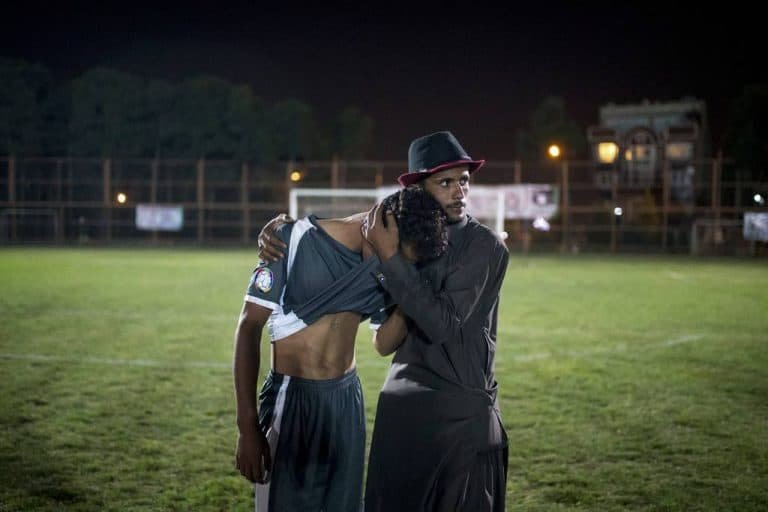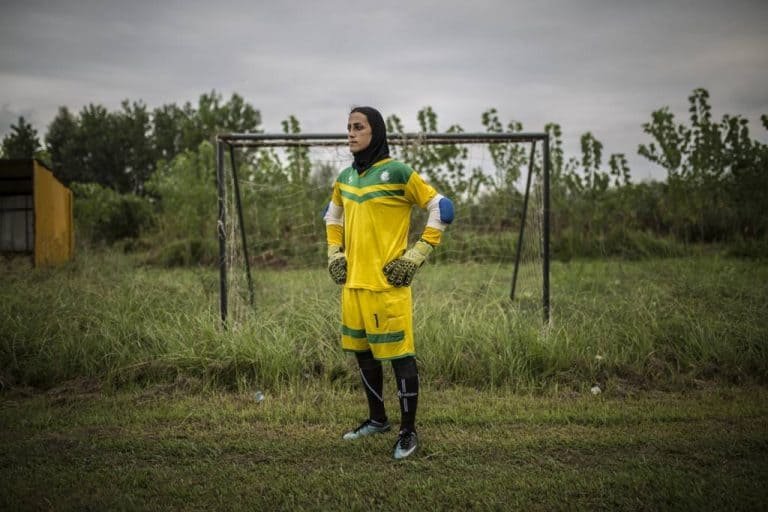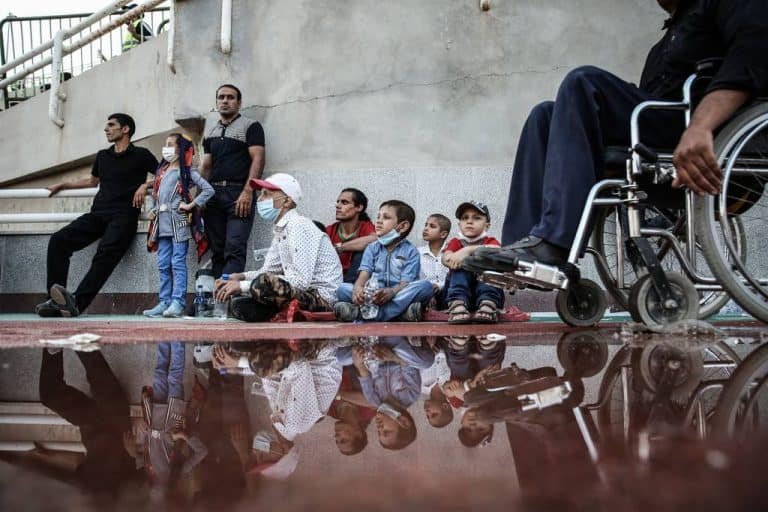“Marginalized Individuals in Society and Football – Interpretation of the Photo Exhibition ‘Podium, Two’ and the Struggling Face of Football”
Simon Critchley, a contemporary English philosopher and author of the book ‘What We Think About When We Think About Soccer’ says: ‘Football values society and the idea of being together as equal human beings, where everyone has the right to say something. The match itself has a kind of socialism, meaning football teams and the culture surrounding them embody a form of socialism. Football is a treasure trove for a sense of empathy, a feeling that we are all here together. Players come and go, but fans remain steadfast for a long time. They have memories and recollections; they are archives and libraries. However, the group photo exhibition ‘Podium, Two’ narrated ‘football Anecdotes’; a football that has now changed and no longer exists as a social phenomenon. Once upon a time, not so long ago, football could symbolize the desires and ideals of all its enthusiasts from every economic and social class and every ideological current. Football, in its essence, was more than just a sport and a phenomenon through which the suppressed anger of a nation played out. “The hand of God” avenges the Argentine sons killed in the Falkland Islands against the British. Even in the Amjadieh Stadium ‘Shahin’ team, when mentioning their beloved team, they divided it into two parts; the first part, ‘Shah,’ – meaning “King” – and the second part, ‘in,’ while stomping their feet on the stands at the same time, symbolically placing ‘Shah’ or “King” under their feet.
However, the commercialization of everything in the past few decades has also affected football, and the consequence of this phenomenon has manifested in the marginalization of a significant portion of society. The photography group “Podium,” which addressed the topic of “deprivation of ownership in sports” in its first exhibition last year in 2016, has now turned its attention to marginalized individuals and groups who are also on the margins in football. “The Stadium of a Hundred Thousand Boys” discusses the prohibition of women entering the stadium, “Angels of Wall 47” focuses on football players with Down syndrome, and “The Girls of Malavan” commemorates the return of the Malavan women’s team after a controversial dissolution, “Emadiyeh” symbolizes Iranian football that has been treated unkindly, “Half with Cancer” portrays children with blood cancer in Ahvaz who go to the stadium in dusty air, “Retired Stars” who have been more or less forgotten, “Imam Ali Society Football League” and football for working children and migrants, and finally, “Mr. Putin’s Guest” and narratives from the 2018 FIFA World Cup in Russia. These eight series make up “Podium, Two.
In the initial seven series of the “Podium, Two” photo exhibition, women, individuals with Down syndrome, working children, migrant children, and other groups who face social deprivation and discrimination are depicted. However, that’s not all; the photographers of this exhibition have shown that the social deprivation of these groups is also evident in football. For example, no media covers the football matches of the “Girls of Malavan” team, and few are even aware of the existence of a football team for individuals with Down syndrome or a football league for working children and migrants. This is the starting point that leads to the completion of a profit-oriented perspective. This perspective only recognizes football when it is approved and showcased by arbitrary national and international institutions. In such an environment, not only individuals but even “Amjadieh,” which was the most significant element and historical symbol of Iranian football, has been completely neglected and consigned to oblivion with indifference over time, and “Azadi” has forcibly taken its place as the symbol of Iranian football.
This time, instead of capturing photos of football celebrities, “Podium, Two” turns to football enthusiasts who are not only celebrities but also experience the flip side of life. These are groups such as working children and migrant children who have been deprived of ownership more than other segments of society, and even their childhood has been taken away from them. After addressing the marginalized aspects of football, “Podium, Two” in its eighth and final series ventures into a completely different space titled “Mr. Putin’s Hospitality,” presenting snippets from the 2018 FIFA World Cup in Russia. However, the subject matter is entirely different this time. In this series, no one in football seems to have been marginalized; instead, it appears that football itself has been pushed to the sidelines due to the prevalence of politics. It seems that the FIFA World Cup, the most significant football tournament in the world, is supposed to be a host for football, but its organization under the rule of Vladimir Putin in Russia has elevated politics above football. Russia, which has transformed into a capitalist superpower after the collapse of the former Soviet Union in recent years, seems to have learned, like other capitalist systems, to commercialize and profit from football.
Article Author: Mehdi Kaboorani
به حاشیه راندهشدگان جامعه و فوتبال – تفسیری از نمایشگاه عکس «پودیوم، دو» و چهره درمانده فوتبال
سایمون کریچلی، فیلسوف معاصر انگلیسی و نویسنده کتاب «وقتی به فوتبال میاندیشیم، به چه میاندیشیم» میگوید: «فوتبال به اجتماع ارزش مینهد و به اینکه بهمثابه انسانهای برابر در کنار هم باشیم، جایی که هر کسی حق دارد چیزی بگوید. خودِ این بازی نوعی سوسیالیسم دارد، یعنی تیم فوتبال و فرهنگ پیرامونش از نوعی سوسیالیسم برخوردار است. فوتبال گنجینهای برای نوعی احساس همدلی است، احساس اینکه همگی ما در اینجا با هم هستیم. بازیکنان میآیند و میروند، اما هواداران برای مدت مدیدی پابرجا هستند. آنها حافظه و خاطرات دارند، آنها آرشیو و کتابخانهاند. اما نمایشگاه عکس گروهی «پودیوم، دو» راوی «خردهروایتهایی درباره فوتبال» بود؛ فوتبالی که حالا تغییر کرده و خبری از آن به عنوان یک پدیده اجتماعی نیست. روزگاری نه چندان دور، فوتبال میتوانست به عنوان نماد آرزوها و آرمانهای تمام شیفتگان خود از هر طبقه اقتصادی و اجتماعی و هر جریان فکری تبارز کند. فوتبال در ذات خود فراتر از یک ورزش و پدیدهای بود که بهواسطه آن خشم فرو خورده یک ملت بر پیشانیبند دکتر سوکراتس نقش میبست، «دست خدا» انتقام پسران آرژانتینی کشته شده در جزایر مالویناس را از بریتانیاییها میگرفت و حتی در امجدیه تیم «شاهین» در مخالفت با محمدرضا پهلوی هنگام نام بردن از تیم محبوب خود، آن را به دو بخش تقسیم میکردند؛ بخش اول؛ «شاه» و بخش دوم «این» که در همین زمان با پا به سکوها میکوبیدند و «شاه» را به شکل نمادین زیر پای خود میگذاشتند

اما تجاری شدن همه چیز در چند دهه گذشته، فوتبال را هم مبتلا کرد و پیامد این امر در به حاشیه رانده شدن بخش عظیمی از جامعه، تجلی یافت. گروه عکاسی «پودیوم» که سال گذشته در نخستین نمایشگاه خود به موضوع «سلب مالکیت در ورزش» پرداخته بود، حالا در «پودیوم، دو» به سراغ افراد و گروههای به حاشیهراندهشدهای رفته که در فوتبال هم به در حاشیه قرار دارند. «استادیوم صدهزار پسری» در مورد ممنوعیت ورود زنان به ورزشگاه، «فرشتگان دیوار ۴۷» در فوتبال مبتلایان به سندروم داون، «دختران ملوان» به مناسبت بازگشت تیم زنان ملوان پس از انحلال پرحاشیه، «امجدیه» به عنوان نماد فوتبال ایران که مورد بیلطفی قرار گرفته، «یک نیمه با سرطان» و کودکان مبتلا به سرطان خون در اهواز که در هوای غبارآلود به ورزشگاه میروند، «ستارههای بازنشسته» که کم و بیش فراموش شدهاند، «لیگ فوتبال جمعیت امام علی (ع)» و فوتبال کودکان کار و مهاجر و در نهایت، «میهمانی آقای پوتین» و روایتهایی از جام جهانی ۲۰۱۸ روسیه، هشت مجموعه «پودیوم، دو» را تشکیل میدهند

در هفت مجموعه ابتدایی نمایشگاه عکس «پودیوم، دو»، زنان، مبتلایان به سندروم داون، کودکان کار و کودکان مهاجر و دیگر گروههایی به تصویر کشیده شدهاند که در زندگی اجتماعی با محرومیت و تبعیض روبرو هستند. اما این همه ماجرا نیست؛ عکاسان این نمایشگاه نشان دادهاند که محرومیت اجتماعی این گروهها در فوتبال هم مشهود است؛ مثلا هیچ رسانهای مسابقات فوتبال تیم «دختران ملوان» را پوشش نمیدهد، کمتر کسی حتی از وجود تیم فوتبال مبتلایان به سندروم داون و لیگ فوتبال کودکان کار و مهاجر خبر دارد. این نقطه ابتدای مسیری است که منجر به تکمیل نگرش سودجویانه سرمایه میشود؛ نگرشی که تنها و تنها فوتبال را زمانی فوتبال میداند که سوی نهادهای جورواجور ملی و بینالمللی تایید شود و به نمایش درآید. در چنین فضایی، نه تنها افراد، بلکه «امجدیه» هم که مهمترین المان و نشانه تاریخی فوتبال ایران بود، در گذر زمان با بیمهری کامل به فراموشی سپرده شده و «آزادی» جای آن را به عنوان نماد فوتبال ایران غصب کرده است

این بار «پودیوم، دو» به جای اینکه عکس سلبریتیهای فوتبال را بگیرد، به سراغ شیفتگان فوتبال رفته که نه تنها سلبریتی نیستند، بلکه روی دیگر سکهٔ زندگی را تجربه میکنند؛ گروههایی مانند کودکان کار و کودکان مهاجری که بیش از سایر طبقات جامعه از آنها سلب مالکیت شده و حتی کودکی آنان نیز به یغما رفته است.«پودیوم، دو» پس از پرداختن به حاشیهراندهشدههای فوتبال، در مجموعه هشتم و پایانی، در فضایی کاملا متفاوت و با عنوان «میهمانی آقای پوتین» به سراغ خردهروایتهایی از جام جهانی ۲۰۱۸ روسیه میرود. ولی این بار موضوع کاملا متفاوت است؛ در این مجموعه عکس هیچکس در فوتبال به حاشیه رانده نشده، بلکه به نظر میرسد خود فوتبال است که بهواسطه تقدم یافتن سیاست در حاشیه قرار گرفته است. گویا قرار است جام جهانی به عنوان مهمترین تورنمنت فوتبالی جهان، میزبان فوتبال باشد اما برگزاری آن در روسیه ٔ تحت حاکمیت ولادیمیر پوتین، باعث ارجحیت سیاست بر فوتبال شده است. به نظر میرسد روسیه که پس از فروپاشی شوروی سابق در سالهای گذشته، حالا به یک ابرقدرت سرمایهداری تبدیل شده، مثل باقی نظامهای سرمایهداری تجاریسازی سازی فوتبال و کسب سود از آن را آموخته باشد
نویسنده مقاله : مهدی کبورانی
